- Home
- Nathan Lowell
Quarter Share Page 2
Quarter Share Read online
Page 2
“What’s a share?” I asked, calling to her from where I sat.
“A share is extra pay ya get if the voyage is profitable. Owners, captains, and the other officers get the most, but everybody gets somethin’,” she called back.
“So in an entry-level position, I’d get a quarter of a share?”
“Yeah, but don’t be plannin’ to retire on it. It’s not much. Better than a spanner to the cranium, but it isn’t all that many creds.”
As I looked through each quarter share listing: engine wiper, mess deck attendant, cargo loader, I realized these were the dirtiest tasks and probably boring to boot. I sighed. Beggars, as they say, can’t be choosers. Unfortunately, even begging couldn’t get me a job where none existed. I shut down the terminal and headed for the exit.
“Thank you, Ms. O’Rourke,” I called over my shoulder, as I braced myself to step back into the midday glare.
“Hey, kid, if ya’re serious about gettin’ a berth, pack a bag and be ready to go.”
I stopped with my hand on the door feeling like a big, cartoon question mark was rising over my head.
O’Rourke beckoned me to the counter. “I like ya. Ya remind me of my nephew. Here’s how this really works. No ship will pull in here with an open quarter share, but they often unload a troublemaker. Some idiot signs on but then doesn’t pull his weight. He gets here, to the ass-end of nowhere, and put ashore with no income and no way home. A few days dirt-side gives him a bit of motivation, so to speak, to do better. Of course, that leaves the ship short-handed.”
“And if I’m ready to ship out…?”
“Well,” she said slyly, “ya’d have to be ready to go on a few stans notice and can’t take much with ya. Twenty kilos is the mass allotment for a quarter share. But ya don’t need clothes and there’s hygiene gear on the ship. Only thing ya really need to take is entertainment cubes and personal stuff.”
“I don’t need clothes?”
“Shipsuits, lad, shipsuits. They come with the berth. Ya pay for them out of yer first few chits. But they don’t count against yer mass allotment. One change of civvies will get ya through, if ya’re careful with ’em.” She smiled at me, and I felt she’d just given me some valuable insight. I just had to figure it out.
“Thanks, Ms. O’Rourke. How will you contact me?”
She pointed to the display that still had my data on it. With a couple of keystrokes, she saved it and gave me a broad wink. “I think I’ll be able to find ya, kid. If ya’re serious, be ready. The Lois McKendrick is comin’ in late next week. Rumor has it she’s got some deadwood that needs seasonin’ dirt-side. That gives ya about ten days to get ready.” She pulled a data cube from a rack under the counter and tossed it to me. “Here, read up. It’ll save ya some problems down the line.”
I nodded with a smile of thanks, stuffed the cube in my pocket, and headed home to figure out what to take with me. How do you fit a whole life into twenty kilos?
***
It didn’t take long to get back to the flat I’d shared with my mother. It still felt weird walking in and knowing she wasn’t there—that I was really alone.
The hardest part was going through her personal things. It made me a bit queasy dealing with her underwear drawer. I felt silly for being so squeamish. I had folded her bras and panties hundreds of times while doing laundry, but this was different somehow. Finally, I took her suits and dresses to the local charity drop. I just emptied the rest into the refuse bin without really looking.
She had a ton of professional stuff like books and papers and such. Her peeda had been with her, and lost in the flitter, of course. She had left a portable computer though. I donated her books to the library, while her pictures, data cubes, and records went into storage boxes. I packed her diplomas on top. Altogether it didn’t amount to much, maybe a hundred kilos in five boxes.
In contrast, looking around my own room, I realized I could walk away and probably wouldn’t miss any of it. My peeda was already stocked and I had some spare storage cubes and my good boots. The problem was my bag. I only had a heavy suitcase. It massed three kilos empty and seemed kind of clunky.
***
After three days of sorting, tossing, filing, and just generally working my way through the flat, I finally finished. I took out O’Rourke’s data cube and slotted it into my peeda. The title was The Spacer’s Handbook published by the Confederated Planets Joint Committee on Trade. The CPJCT, it turned out, was the arbiter of all things trading related. The cube reminded me of the scout manual I had as a kid. It had everything you needed to know about being a spacer: what to wear, how to wear it, and when and whom to salute. A little holo clip showed the proper technique for the later. The saluting part wasn’t too difficult, and you only did that under special circumstances, and only to officers.
The manual listed the various ranks and shares: quarter share, half share, full share, and on up to owner’s share. The thing was huge. I checked the size on the chip and gasped when I saw just how big it was. The Encyclopedia Galactica was smaller. I hoped I wouldn’t need to read the whole thing.
The introductory chapter caught my eye with a small section titled: Shipping Out. It explained the mass allotment increased as you rose through the ranks. As O’Rourke had said, the shipsuits were provided and items like toothpaste, shampoo, and shaving gear were all standardized and available on board. The Handbook recommended that a new shipmate should report wearing decent civilian attire and not worry about a change of clothing. The illustration showed a somewhat dated picture of what a well-dressed person might wear to a casual dinner with a friend. The jackpot in this section was the recommendation of the duffel bag for loading your gear. The lightweight mono-mol bag encompassed almost a half-cubic meter of volume, but massed less than twenty grams and could be folded up to about the size of a handkerchief when empty. Spacers considered it a standard and, according to The Handbook, “could be purchased at a reasonable cost at any Union Hall.” I smiled, thinking I should pay another visit to my friend O’Rourke. In the meantime, I started weighing out gear on the bathroom scale.
Twenty kilos turned out to be a lot.
Chapter 2
Neris
2351-September-03
My peeda trilled sharply, jarring me awake. The display showed a simple text message from O’Rourke: Time to go! I was more than ready. I wanted to get on with it before the anticipation drove me crazy, or my money ran out. While the payout from the company had been enough to cover ninety days’ rent, I had other expenses to cover and my funds evaporated at an alarming rate. The sooner I stopped paying to live on Neris, the better.
Shipping the personal artifacts turned out to be part of Mom’s employment contract. A team from Neris showed up to take our stuff to a storage facility on Siren. Mom had designated it as origin-of-record on the employment forms but I didn’t recall any connection we had there. I think she named it because it was the nearest Confederation planet. The storage company would keep our stuff as long as I made the payments. Pre-paying for a stanyear took a big hit to my cred reserve, but at least I wouldn’t have to worry about it.
Between O’Rourke and The Handbook, I’d managed to get my duffel properly stenciled with my name and ID. In the end, I’d kept Mom’s computer, a relatively new portable model. It had processing capabilities that my peeda didn’t. Her computer credentials gave me almost unlimited access to the university and I used them until administration cut me off. I got quite a bit of stuff downloaded including materials on astrogation, environmental sciences, advanced math, accounting, materials sciences, and even some on plant biology. These were all subjects recommended as useful by The Handbook. They looked overwhelming, but I burned them onto cubes and stashed them in my duffel. Even with the holo and music cubage, I was way under my allotment and only had about eight kilos.
I tossed what few things remained into the disposer, and shouldered the nearly empty duffel bag. At the door, I stopped and looked back before flipping the
light switch. I could feel a lump start to harden in my throat and my eyes water. This apartment had been home for most of my life and I was walking away forever—the connections severed cleanly, surgically. I looked around, smiling at the memories and listening for the echoes of our time in the flat. In the end, I heard nothing except the soft whooshing of the environmentals. I flipped off the lights and locked the door behind me for the last time.
***
When I got to the Union Hall, it was a madhouse. For the first time I saw somebody there besides O’Rourke or the Assistant Hall Manager, a mousy man named Fredericks who didn’t talk much. People filled the hall. They queued up in lines to use the data ports or waited to see O’Rourke or Fredericks. All of them talked loudly to each other and their accumulated voices made the huge, echoing space almost unbearable.
Shrugging off the sensory assault, I got into O’Rourke’s line and arrived at the counter in a surprisingly short time. She smiled when she saw me. “You ready to go, kid? There’s no backin’ out once yer under Articles.”
I nodded. I knew the drill from The Handbook. Once I signed, I would be committing to serve for two stanyers. It wasn’t quite the military, but it was close and I had no other options. This door opened on a new future. My tongue stuck to the inside of my mouth and my stomach cramped. “Yeah, I’m as sure as I can be. Thanks for everything, Ms. O’Rourke.”
She smiled wider at that. “Good to go then, lad.” She pressed the buzzer that opened the counter and nodded toward a door. “Through there. Captain Giggone will want to talk to ya. Pass the interview and we can get ya processed.” She winked. “I put in a good word for ya so don’t make me look bad.”
Swallowing hard, I pushed through the gate and into the office. A harried-looking, gray-haired woman sat behind the desk. She appeared older than Mom but somehow more energetic. I stood at attention and waited for her to acknowledge my presence. The captain examined me for a few heartbeats while I did my best not to shake. “Sound off!” she barked.
“Wang, Ishmael. Unrated. Applying for an available quarter share berth, sar.” O’Rourke had coached me in the appropriate responses. She had me practice the drill several times on my last visit so I knew what to do. The Handbook also provided instructions on how to address various officers under different circumstances. The book covered this precise scenario, complete with a sample script.
“Why do you want to ship out?” she asked.
“I need to leave before the Neris Company kicks me off-planet. I don’t have enough creds to buy passage.” Belatedly, I remembered to add, “Captain.”
“You know this is going to be difficult, don’t you, Wang?”
I nodded.
“Excuse me, Wang? Did you say something?” she barked.
“Um, yes, sar, that is, no, sar. That is. I know it’s going to be difficult, Captain.” Gods, I sounded like such a jerk.
She stood up and looked at me. “Ms. O’Rourke says you’re good people. Why would she say that, Mr. Wang?” She asked the question with a softer tone to her voice.
The fact that she didn’t follow the script caught me off guard and I blinked in confusion. “I—I don’t know, Captain. I’ve only met her a couple times. She’s been very helpful.”
After a moment’s pause she resumed her previous tone. “You need to know I run a tight ship and don’t put up with crap. You’ll be the lowest of the low, and work your backside off for the next two stanyers. The work will be boring, difficult, and unrelenting. Your shipmates will taunt you, and the living conditions will be challenging to somebody used to having his own room on a nice, quiet planet. In short, your ass is mine and will be until I say it’s not, or your contract expires, whichever comes first. Can you deal with that, land rat?”
I paused for a second, or perhaps two, before answering her. She summed it up succinctly and brutally. I had no idea which quarter share berth I might get. It really didn’t matter. I needed to get off the rock and had few choices. “Honestly, I don’t know, Captain. But I’d like to give it my best shot.”
She smiled warmly then. “Good answer, Mr. Wang. Welcome aboard.” She stuck out her hand and I shook it. “You’ll get a standard contract, steward attendant pay plus quarter share. Do well and I’ve always got a slot open. Now, go get your contract signed and your shipsuit on. Most of the little band we call crew will be off the ship, and we can get you settled in without a crowd of hecklers to help.” She grinned and I saw a twinkle in her eye.
“Thank you, Captain,” I told her and meant it.
***
Time shifted to an accelerated pace. I thumbed my contract and was officially under Articles, employed by Federated Freight, the Lois McKendrick’s owner company. Fredericks, the Assistant Hall Manager, punched through the paperwork, sending the notifications to Neris Company and snipping off the few dangling threads of my old life. He showed me to a changing room. O’Rourke had taken my measurements earlier and already selected the right sized shipsuit and boots in Federated Freight colors of green and gold. The suit fit my meter and a half perfectly and the shipboots molded to my size twelves as if they had grown there.
As I packed my shore leave clothes into the duffel, I caught movement out of the corner of my eye. A stranger stared back at me from what I realized was a mirror. He looked me over from the sandy mop on my head, down the tailored shipsuit, to my new boots. I was thin after three weeks of eating my own cooking but Mom had always said I was wiry. That was apparently a good thing. The stranger smiled and I found myself smiling back. He straightened up and shouldered his duffel. I gave him a kind of salute and headed out the “Crew Only” doors to find the shuttle.
The hallway beyond the doors led to a security checkpoint and an entry tube. Mom and I had taken trips up to the orbital before. It was a popular tourist destination for residents as it was technically Confederation space and not owned by NerisCo. The exotic shops and restaurants provided variety from the largely homogeneous life on a company planet. This trip, however, was much different. The stark behind-the-scenes entry had no decorative panels or padding. The floors, ceiling, and even the walls, had a certain gritty look—a kind of utilitarian plainness that felt disconcerting at first. Stenciled labels stood out on exposed pipes, electrical runs, and hydraulic lines. After the passenger port’s careful, pastel decor, the crew tube felt strange but refreshingly more real.
All this splashed across my brain in a surreal time warp where everything progressed at light-speed around me, but where I moved in a kind of paradoxical slow motion. In the next blink, I stowed my duffel in the overhead and strapped down on a well-worn shuttle seat. Again, the shuttle felt at once familiar and strange, like the difference between a passenger flitter and a cargo crawler. Even the seat belts were unfamiliar, with a cross-the-chest X harness instead of the single shoulder strap I normally used. It was easy enough to figure out, just different. This was going to take some getting used to. My eyes kept trying to focus, but the starkness of my surroundings made everything blur together.
The shuttle pilot came through the cabin smiling and nodding professionally as he examined the craft. “We’ll be up to the station in just a few ticks,” he said. “No time for beverage service and if you need to use the head, I’d do it now.” This was apparently some kind of joke because he chuckled.
“Thanks,” I answered, somewhat dazedly.
As he finished his inspection, half a dozen people wearing gray and blue shipsuits came into the cabin and strapped down. Small patches on their shoulders read “Murmansk.” I assumed that was the name of another of the ships docked at the orbital. They nodded pleasantly to me, but absorbed themselves in chatting up one of their group who apparently had engaged in some misadventure overnight. She seemed embarrassed by the attention but the group teased her in good-natured fun and she gave as good as she got.
My ears popped when the pressure doors closed and the locking rings thumped away from the hull. The speakers gave a ping-ping-pong sound and a woma
n’s voice said, “Secure for lift.” With no more ceremony than that, the shuttle got underway and boosted into the clear, golden afternoon light. I took one last look out the port at the rows of granapple vineyards arrayed across the landscape as we spun upward crawling out of the gravity well. The acceleration pressure pinning me to my seat seemed incongruous with the perceived decrease in speed as we gained altitude. The shuttle rolled and I lost sight of the ground, just the darkening sky and a bit of the stubby wing, flashing red from the blinking navigational lights along the side of the ship. The engine noise ramped back as we climbed and the air outside became thinner. Soon, the only sound came from the airframe itself. I settled down and zoned out completely until the heavy clunks of the docking clamps shuddered the craft. The trip had taken a full stan, but my warped time sense made it feel like a tick. The cabin speakers gave a pong-ping sound and the other passengers unbuckled even before the woman’s voice said, “Docking complete.” I let them clear out before I hit the releases and retrieved my duffel.
***
Outside the shuttle bay, a kid waited in a green and gold shipsuit like mine. I thought he might be older than I was, but his baby face made him look younger. He grinned when he saw me and held out his hand. “You must be Wang. I’m Philip Carstairs. Everybody calls me Pip.” His green eyes had a laugh in them and I found myself grinning back.
“Hi,” I replied. “Call me Ishmael.”
He blinked a couple of times then looked at a note on his tablet before guffawing. “Oh my gods and garters—that’s really your name?”

 By Darkness Forged (Seeker's Tales from the Golden Age of the Solar Clipper Book 3)
By Darkness Forged (Seeker's Tales from the Golden Age of the Solar Clipper Book 3) The Wizard's Butler
The Wizard's Butler Cape Grace
Cape Grace By Darkness Forged
By Darkness Forged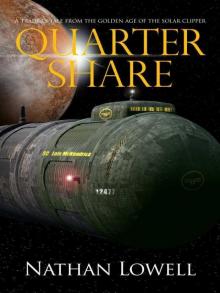 Quarter Share
Quarter Share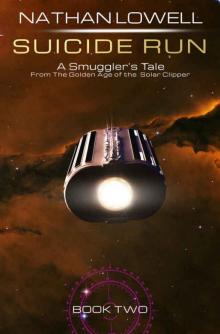 Suicide Run (Smuggler's Tales From the Golden Age of the Solar Clipper Book 2)
Suicide Run (Smuggler's Tales From the Golden Age of the Solar Clipper Book 2) Home Run (Smuggler's Tales From the Golden Age of the Solar Clipper Book 3)
Home Run (Smuggler's Tales From the Golden Age of the Solar Clipper Book 3) To Fire Called (A Seeker's Tale From The Golden Age Of The Solar Clipper Book 2)
To Fire Called (A Seeker's Tale From The Golden Age Of The Solar Clipper Book 2) Home Run
Home Run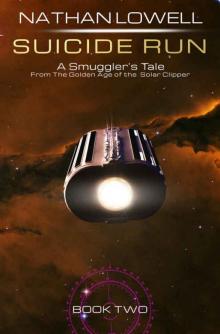 Suicide Run
Suicide Run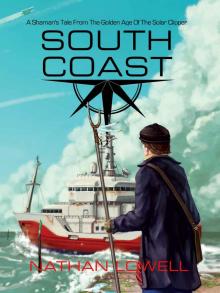 South Coast (Shaman's Tales From The Golden Age Of The Solar Clipper Book 1)
South Coast (Shaman's Tales From The Golden Age Of The Solar Clipper Book 1) Milk Run (Smuggler's Tales From The Golden Age Of The Solar Clipper Book 1)
Milk Run (Smuggler's Tales From The Golden Age Of The Solar Clipper Book 1) Ravenwood (Tanyth Fairport Adventures)
Ravenwood (Tanyth Fairport Adventures) Captain's Share (Trader's Tales from the Golden Age of the Solar Clipper)
Captain's Share (Trader's Tales from the Golden Age of the Solar Clipper) Owner's Share (Trader's Tales from the Golden Age of the Solar Clipper)
Owner's Share (Trader's Tales from the Golden Age of the Solar Clipper) Half Share
Half Share The Hermit of Lammas Wood
The Hermit of Lammas Wood Ravenwood
Ravenwood Full Share
Full Share A Light In The Dark (Tales of the Deep Dark)
A Light In The Dark (Tales of the Deep Dark) In Ashes Born (A Seeker's Tale From The Golden Age Of The Solar Clipper Book 1)
In Ashes Born (A Seeker's Tale From The Golden Age Of The Solar Clipper Book 1) Double Share: Solar Clipper Trader Tales
Double Share: Solar Clipper Trader Tales Zypheria's Call (A Tanyth Fairport Adventure)
Zypheria's Call (A Tanyth Fairport Adventure)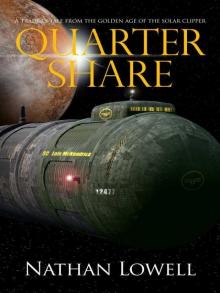 Quarter Share attftgaotsc-1
Quarter Share attftgaotsc-1